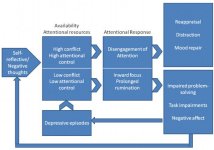Understanding depressive rumination from a cognitive science perspective: the impaired disengagement hypothesis [Clin Psychol Rev. 2011]
Persisting negative thoughts are considered a hallmark of depression. Recent information-processing approaches have begun to uncover underlying mechanisms of depressive rumination. Despite marked advances in this area, there is a lack of integration between psychopathology and cognitive (neuro) science research. We propose the 'impaired disengagement' hypothesis as a unifying framework between both approaches. The core tenet of our model is that prolonged processing of self-referent material is due to impaired attentional disengagement from negative self-referent information. We discuss empirical evidence for this framework and outline future ways in which the causal predictions of this model can be tested. The proposed framework can account for effectiveness of various treatments for depression and may aid in devising new interventions to target depressive cognition.

Persisting negative thoughts are considered a hallmark of depression. Recent information-processing approaches have begun to uncover underlying mechanisms of depressive rumination. Despite marked advances in this area, there is a lack of integration between psychopathology and cognitive (neuro) science research. We propose the 'impaired disengagement' hypothesis as a unifying framework between both approaches. The core tenet of our model is that prolonged processing of self-referent material is due to impaired attentional disengagement from negative self-referent information. We discuss empirical evidence for this framework and outline future ways in which the causal predictions of this model can be tested. The proposed framework can account for effectiveness of various treatments for depression and may aid in devising new interventions to target depressive cognition.

